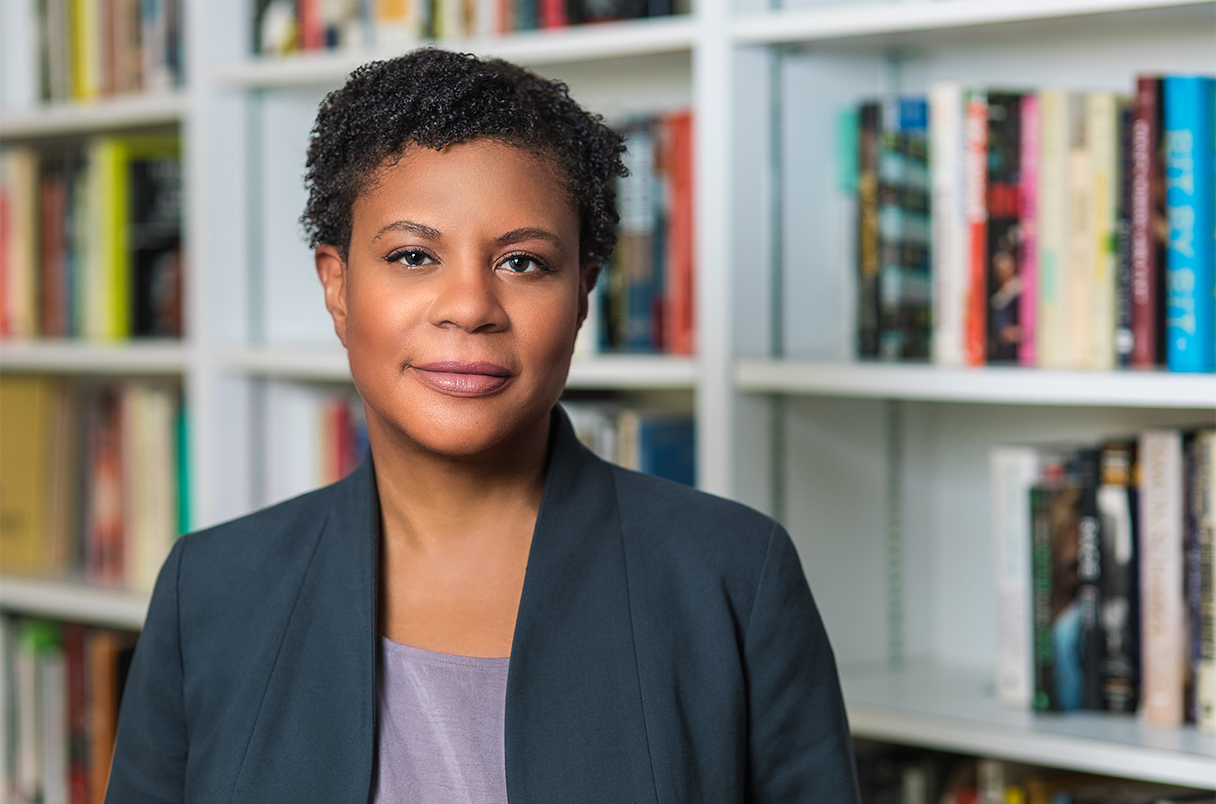Sociologist Alondra Nelson to Discuss AI, Public Policy, and Democracy at Northwestern
Former White House official to offer insights on 'Governing the Future'
Get all our news
We need to keep imagination, innovation, and a hope for the world that we want, not just the world that we are trying to mitigate, in our conversation. ”
Alondra Nelson
Harold F. Linder Professor at the Institute for Advanced Study and Senior Fellow at the Center for American Progress

How should we approach the governance of artificial intelligence models and tools to steward their potential public benefit? Do we need new rules, regulations, and standards to accompany each new or emerging technology? Or is there another way? Acclaimed sociologist and writer Alondra Nelson will provide insights to these questions as the featured speaker for Northwestern University’s Distinguished Public Policy Lecture Series at 4 p.m. on Wednesday, March 27.
REGISTER NOW for the lecture with Alondra Nelson on "Governing the Future: On AI, Public Policy, and Democracy."
Nelson, the Harold F. Linder Professor at the Institute for Advanced Study, served as deputy assistant to President Joe Biden and acting director of the White House Office of Science and Technology Policy (OSTP). As a distinguished senior fellow at the Center for American Progress, and a science and technology policy advisor, she has provided guidance to local, state, and federal governments, multilateral and intergovernmental organizations, legislators, civil society, and others.
In her lecture, Nelson will draw on the White House’s “Blueprint for an AI Bill of Rights,” a cornerstone of President Biden’s historic AI executive order, and a recent study from the AI Democracy Projects to discuss how governing for the future paradoxically requires anchoring in long if imperfectly held democratic commitments. These commitments include civil rights and civil liberties, regulating toward prosocial outcomes rather than around technological objects—and doing both while advancing research and policy innovation.
“As we all wrestle with how to successfully, ethically, and equitably integrate artificial intelligence in our everyday and working lives, we are thrilled to welcome Alondra Nelson, one of the world’s leading thinkers on science policy and technology—especially as they relate to AI and inequality—to Northwestern,” said IPR Director Andrew V. Papachristos, the John G. Searle Professor of Sociology.
The community-wide event is co-sponsored by Northwestern’s Institute for Policy Research (IPR) and the Medill School of Journalism, Media, Integrated Marketing Communications, with support from the Department of Sociology, the Science in Human Culture Program, the Klopsteg Lecture Fund, and the CONNECT Program.
The in-person-only lecture will take place at 4 p.m. on Wednesday, March 27, at Northwestern University’s McCormick Foundation Center, 1870 Campus Drive, Evanston, Ill. A reception will follow.
This event is free and open to the public, but tickets are required. Register now. Seats will be available first come, first served.
In her research, Nelson examines questions in science, technology, and social inequality. Her work offers a critical and innovative approach to the social sciences in fruitful dialogue with other fields. Her major research contributions are situated at the intersection of racial formation and social citizenship, on the one hand, and emerging scientific and technological phenomena, on the other.
"We need to keep imagination, innovation, and a hope for the world that we want, not just the world that we are trying to mitigate, in our conversation," she said in a recent talk at Oxford University.
Nelson has contributed to national policy discussions on inequality and on the social implications of new technologies, including artificial intelligence, big data, and human gene-editing in Science, PLOS: Computational Biology, Genetics in Medicine, and the American Journal of Public Health. Her essays, reviews, and commentary have appeared in many national and international outlets, such as The New York Times, Foreign Policy, Le Nouvel Observateur, CNN, and BBC Radio, among others.
In her role as deputy assistant to President Biden, she was the first African American and first woman of color to lead U.S. science and technology policy. At OSTP, she spearheaded the development of the “Blueprint for an AI Bill of Rights,” provided guidance to expand tax-payer access to federally funded research, served as an inaugural member of the Biden Cancer Cabinet, strengthened evidence-based policymaking, and galvanized a multisector strategy to advance equity and excellence in STEM, among other accomplishments. Including her in the list of "Ten People Who Shaped Science in 2022," Nature said of Nelson's OSTP tenure, “this social scientist made strides for equity, integrity and open access.”
ABOUT THE IPR DISTINGUISHED PUBLIC POLICY LECTURE SERIES
As one of the country’s top interdisciplinary social science research institutes, the Institute for Policy Research (IPR) provides a home at Northwestern University for trailblazing policy research and thought-provoking discussion. Each year, it brings in some of the world’s greatest policy minds for its Distinguished Public Policy Lecture series. From its first lecture with then-Secretary of Health and Human Services, Donna Shalala, in 1994, IPR has continued to welcome a stellar line-up of world-class thinkers, top government officials, MacArthur Genius and Nobel Prize winners, and other policy luminaries. Their discussions inspire passionate dialogue and dare faculty, students, and the wider public to imagine how, for example, we can create an equitable economy, combat entrenched poverty, or grapple with what the future of AI holds.
To celebrate the series’ 30th anniversary this year, IPR is welcoming two of the nation’s leading thinkers on race and technology and AI and science policy, Princeton sociologist and author Ruha Benjamin, who spoke on Jan. 23, and former White House official and AI thought leader Alondra Nelson of the Institute for Advanced Studies, who will speak on March 27. We invite you to join us for our upcoming events.
For more information about the event, please email ipr@northwestern.edu or call 847-491-3395.
Published: February 27, 2024. Updated: March 5, 2024.


